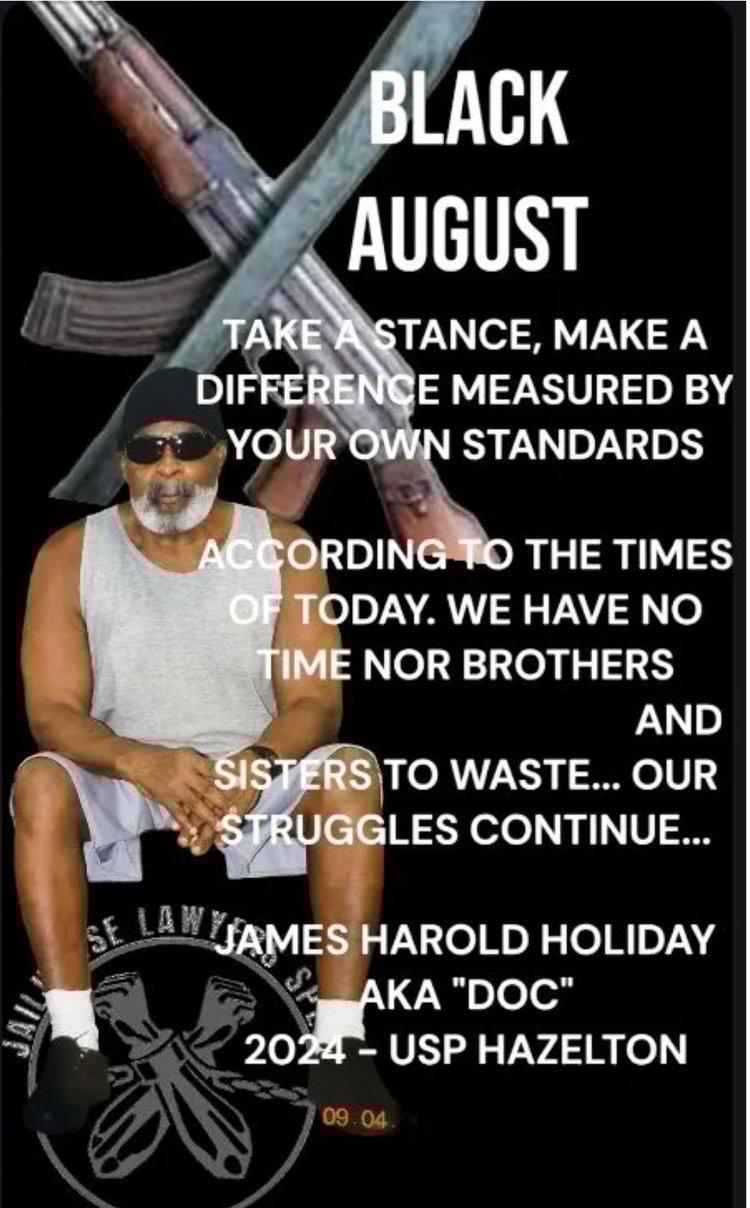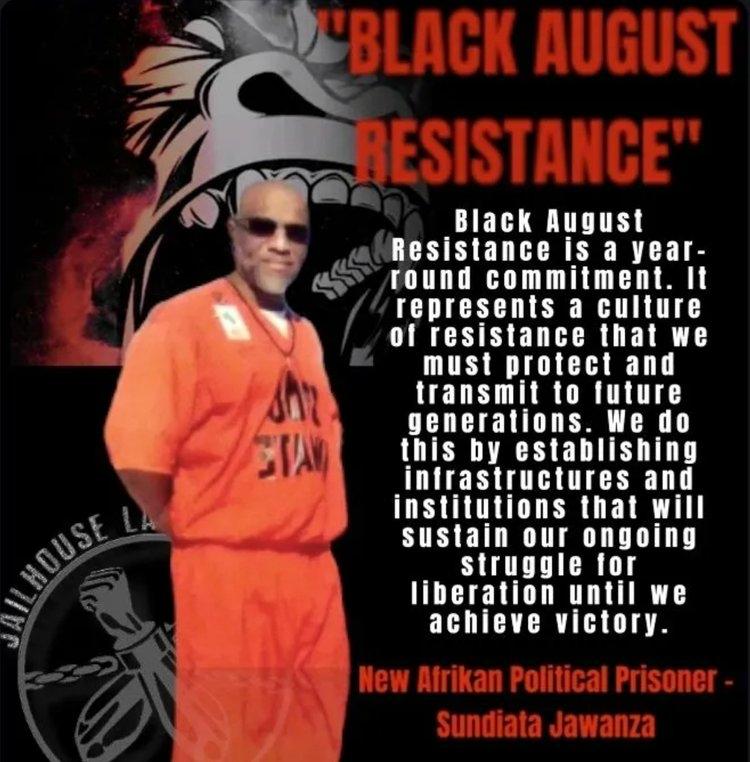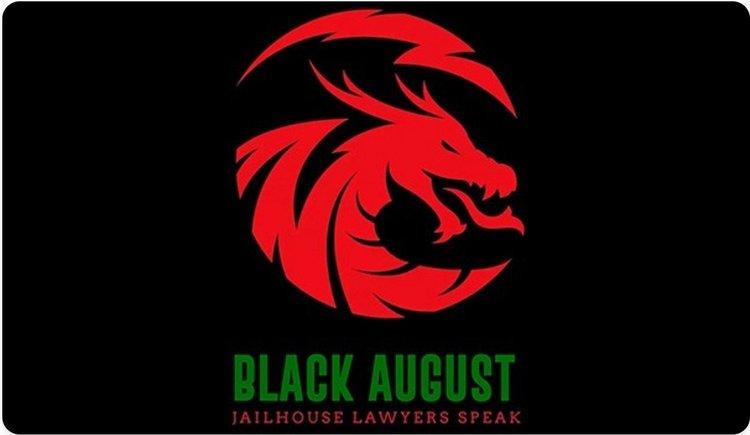
This is second Black August words for Sun…
The significance and important part of Black August is that those who have joined in, with what it’s commemorations are inspired by, and identify with the deep sense of commitment and sacrifices made by this specific group of brothers, (Black men) who had grown up out of the degradations of California’s racist prison system and proclaimed their humanity in extraordinary form; to the extent that they declared and took their freedom or death in furtherance of Black people’s historical struggle plus the attempted liberation of themselves and other comrades/prisoners to further the political demands being made on Amerika by Blacks across the country and inside its prison walls. Thing is, this sort of thing builds pride in our history as a people, commemorations, builds traditions which builds cultural (group) identification and awareness of common destinies. All of our COMMON DESTINIES…
We celebrate these brothers and others of our peoples who have likewise sacrificed lives and brought progress which made this month of August worthy of standards to be emulated.
TAKE A STANCE, MAKE A DIFFERENCE MEASURED BY YOUR OWN STANDARDS ACCORDING TO THE TIMES OF TODAY. WE HAVE NO TIME NOR BROTHERS AND SISTERS TO WASTE… OUR STRUGGLES CONTINUE…
The following incidents are part of the origins of Black August’s commemorations:
On August 7th, 1971 young 16 year old Jonathan Jackson stepped into one of America’s court rooms, short trench coat with guns of liberation hidden; as he approached his position he announced “all right gentlemen I’m taking over now” and took control of the court with intent to liberate prisoners of San Quentin there going to trial. They eventually took hostages of judge and jury to further demand that other San Quentin prisoners (freedom fighters) be released including Jonathan’s brother George Jackson. Jonathon died that day August 7th, under a hail of bullets (from San Quentin’s guards and other law agencies) along with other freedom fighters; William Christmas, James McClain; one survived, Ruchell Magee, [who was eventually paroled and died]; of the hostages, the judge died; a district attorney and three female jurors survived their wounds, and the highest tribute to events of that day was given by George Jackson, Jonathon’s brother in his published book “Soledad Brothers” last pages of his letter to Joan, quoted as follows
Dear Joan
WE reckon all time in the future from the day of the man child’s death.
Man-Child, Blackman Child with submachine gun in hand, he was free for a while, I guess that is more than most of us can expect. I want people to wonder at what forces created him, terrible, vindictive, cold, calm man-child, courage in one hand, the machine gun in the other, scourge of the unrighteous “an ox for the people to ride”!
Go over all the letters I’ve sent you, any reference to Georgia (their mother) being less than a perfect revolutionary’s mama must be removed. Do it now! I want no possibility of anymore misunderstanding her as i did. She didn’t cry a tear. She is, as I am, very proud. She read two things into his rage, love and loyalty…
I cant go any further, it would just be a love story about the baddest brother this world has had the privilege to meet, and it’s just not popular or safe to say I love him. Cold and Calm, “all right gentleman, I’m takin over now” Revolution…!
(note that last sentence was George quoting Jonathan’s statement to the court on August 7th.)
On August 21st, 1971 Jonathon’s brother comrade George Jackson; having a righteous love for the People and perfect hate for the enemies of the People chose August 21st’s confrontation with the guards of San Quentin’s adjustment center to exact retribution plus to fulfill his destiny of liberation/freedom or death.
The exact unfolding of events on that day is not public knowledge : what is known is after an attempted search of George returning from a visit, an unidentifiable gun emerged, source unknown but the gun became the object of confrontation between the guards and George, who gained its possession, subdued the guards then demanded that the doors of prisoners locked in the adjustment center be opened. The aftermath of that was that two avowed white racist prisoners were killed along with three guards; before George was gunned down by San Quentin’s gun tower guards as he and Larry Spain made their way out of the adjustment center towards the North double walls of San Quentin (an unlikely route for escape attempt as the prevailing claims has it). Larry Spain was also out on the path and captured. He later won freedom and release from prison.
Black August resistance and commemoration encompasses much more as other contributions will be put forward.
CANT STOP – WONT STOP
DOC
** Doc at the time of this communication in late July 2024 was housed at FBOP USP Hazelton.

Commemorating Our New Afrikan Revolutionaries:
The FLEA Days in Black August is important as we recognize and commemorate the revolutionaries who have made the ultimate sacrifice in the liberation struggle. Within the framework of Black August, there are four significant days known as FLEA days in Weusi Agosti: the 1st, 7th, 13th, and 21st. These days hold special significance as we honor our fallen.
On the first FLEA day, August 1st, 1978, we remember the assassination and medical neglect of Khatari Gaulden. His untimely death serves as a stark reminder of the injustices faced by revolutionaries and the price they pay for their unwavering commitment.
The second FLEA day, August 7th, commemorates the Marin Court Rebellion of 1970. It is a day to reflect on the lives lost, including Jonathan Jackson, James McClain, and William Christmas. Their courageous actions during the rebellion exemplify the spirit of resistance and the lengths individuals will go to challenge oppressive systems.
Moving to the third FLEA day, August 13th, we honor the memory of W.L. Nolen, Alvin Miller, and Cleveland Edwards. These individuals were assassinated by prison guards on January 13, 1970. Their lives serve as a testament to the brutal repression faced by those who dare to fight back against white supremacy and speak truth to power.
Lastly, on the fourth FLEA day, August 21st, we pay tribute to George Jackson, who was assassinated by prison guards in 1971. His unwavering dedication to the cause of liberation and his powerful writings continue to inspire generations of activists.
These FLEA days hold immense significance within the Black August observance. They remind us of the sacrifices made by our revolutionaries and serve as a call to action to continue their legacy. As we participate in Black August, we honor their memory and reaffirm our commitment to the struggle for justice, equality, and liberation.
In conclusion, the FLEA days in Weusi Agosti are an integral part of the Black August. They provide us with opportunities to reflect, commemorate, and draw inspiration from the lives of our fallen comrades. As we engage in the fasting, abstinence, educational pursuits, and symbolic gestures of Black August, let us also remember and honor our fallen during Black August Memorial- BAM. Through our collective efforts, we strive to build a world that recognizes and upholds the ideals for which they fought and sacrificed.
New Afrikan Political Prisoner,
Sundiata Jawanza

Black August mutual aid goes 100% directly towards people inside that need commissary, law books and phone time. This mutual aid will be distributed through the Jailhouse Lawyers Speak national network.